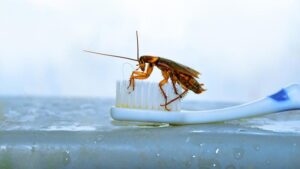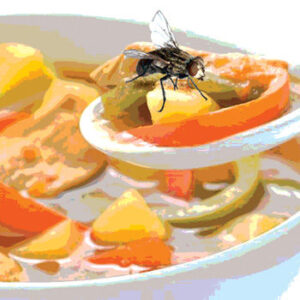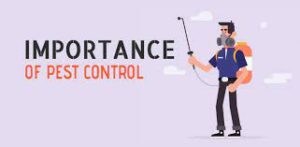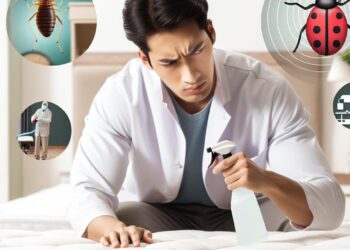Pests are a nuisance in many households and businesses. They can cause property damage, contaminate food, and spread disease. In this article, we will explore the impact of pests on public health and safety and discuss why it is important to address pest infestations promptly.
The Dangers of Pest Infestations
Pest infestations are a common problem in many homes and businesses. From cockroaches to rodents, pests can cause a range of issues that can affect public health and safety. In addition to being unsightly and inconvenient, pests can also be carriers of disease and cause property damage. In this article, we will examine the impact of pests on public health and safety and explore the importance of pest control.

Diseases Spread by Pests
Pests are known to spread a variety of diseases that can be harmful to humans. For example, cockroaches are known to carry Salmonella, which can cause food poisoning. They can also trigger asthma and allergies in some people. Rodents, on the other hand, are known carriers of hantavirus, which can cause severe respiratory illness. In addition to these diseases, pests can also spread other infections, such as Lyme disease, West Nile virus, and dengue fever.
Contamination of Food and Water
Pests can also contaminate food and water supplies. When pests such as rodents, cockroaches, and flies infest a building, they can leave behind droppings, urine, and saliva that can contaminate surfaces and food. This can lead to the spread of diseases such as E. coli and Salmonella. In addition to food contamination, pests can also contaminate water supplies, which can lead to the spread of waterborne illnesses.

Property Damage
Pests can also cause property damage. For example, termites can cause significant damage to the structure of a building if left untreated. Rodents can also cause damage by chewing through wires, insulation, and other materials. This can lead to fire hazards and other safety issues.
The Importance of Pest Control
Given the potential dangers of pest infestations, it is important to address them promptly. Regular pest control measures can help prevent infestations and control existing ones. This can help protect public health and safety by reducing the spread of diseases, preventing property damage, and minimizing food and water contamination.

Protecting Public Health and Safety from Pests
Pests can have a significant impact on public health and safety. From spreading disease to contaminating food and water supplies, pests can cause a range of problems that can be harmful to humans. By addressing pest infestations promptly and implementing regular pest control measures, we can help protect public health and safety and ensure that our homes and businesses remain safe and healthy environments for everyone.
Dangers of Pest Infestations
Pest infestations can be a nuisance in any household or business. However, they can also pose significant dangers to public health and safety. In this section, we will discuss some of the specific dangers associated with pest infestations.
Asthma and Allergies
Pests such as cockroaches and rodents can trigger asthma and allergies in some people. The feces, saliva, and body parts of these pests can become airborne and cause respiratory problems. For people with asthma, exposure to cockroach allergens can worsen symptoms and trigger asthma attacks. Similarly, rodents can spread allergens through their urine and feces, leading to allergic reactions in some people.

Infectious Diseases
Pests are known carriers of a variety of infectious diseases that can be harmful to humans. For example, rats and mice can spread hantavirus, which can cause severe respiratory illness. Fleas, ticks, and mosquitoes can also spread diseases such as Lyme disease, West Nile virus, and dengue fever. Cockroaches are known carriers of Salmonella, which can cause food poisoning, and E. coli, which can cause severe gastrointestinal illness.
Food and Water Contamination
Pests such as rodents, cockroaches, and flies can contaminate food and water supplies. They can leave behind droppings, urine, and saliva that can contaminate surfaces and food. This can lead to the spread of diseases such as E. coli and Salmonella. In addition to food contamination, pests can also contaminate water supplies, which can lead to the spread of waterborne illnesses.
Property Damage
Pests can cause significant property damage if left unchecked. For example, termites can cause structural damage to a building, leading to safety hazards and expensive repairs. Rodents can also cause damage by chewing through wires, insulation, and other materials. This can lead to fire hazards and other safety issues.
Preventing Pest Infestations
Preventing pest infestations is the key to protecting public health and safety. There are several steps that can be taken to prevent pests from entering a building:
- Seal Entry Points: Pests can enter a building through even the smallest cracks and holes. Seal any entry points, including around doors, windows, pipes, and wires.
- Keep Food Sealed: Pests are attracted to food sources. Keep food sealed in airtight containers, and clean up any spills or crumbs immediately.
- Dispose of Trash Properly: Pests are attracted to garbage. Make sure to dispose of trash properly in sealed containers.
- Maintain Cleanliness: Regular cleaning can help prevent pests by removing potential food sources and hiding places.
- Hire a Pest Control Professional: Regular pest control treatments can help prevent infestations and control existing ones. A pest control professional can also identify potential entry points and provide recommendations for prevention.

Pests can have a significant impact on public health and safety. Asthma and allergies, infectious diseases, food and water contamination, and property damage are just a few of the dangers associated with pest infestations. Preventative measures and regular pest control treatments can help protect against these risks, ensuring a safer and healthier environment for all.
Conclusion
Pest infestations can pose significant dangers to public health and safety. From spreading disease to contaminating food and water supplies and causing property damage, pests can have serious consequences if left unchecked. Regular pest control measures can help prevent infestations and control existing ones, protecting public health and safety and ensuring that our homes and businesses remain safe and healthy environments for everyone. Together, we can work towards a safer, healthier environment for everyone.
















